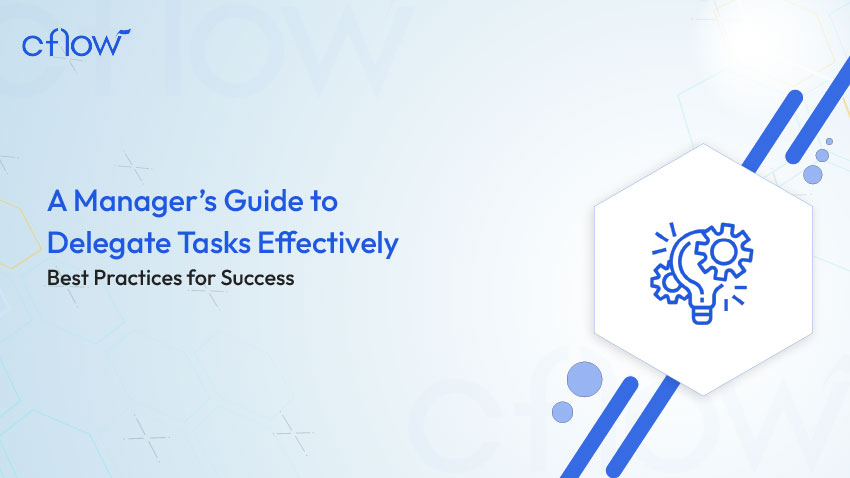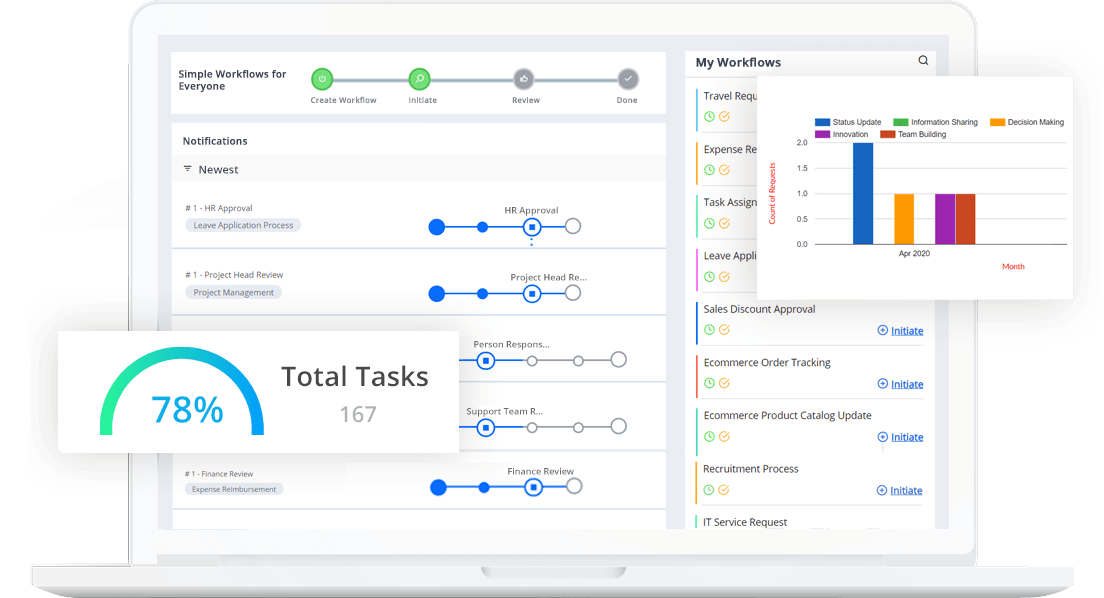A Manager’s Guide to Delegate Tasks Effectively: Best Practices for Success

Key takeaways
Task delegation enhances efficiency, improves time management, and allows managers to focus on strategic priorities.
Delegating tasks effectively requires clear communication, assigning tasks based on skillsets, and using task management tools.
Challenges in manual delegation include lack of clarity, accountability issues, and inefficient tracking, which can be resolved with structured processes.
Knowing when to delegate is crucial—routine tasks, time-consuming assignments, and skill development opportunities should be delegated.
Delegation in project management ensures smooth workflow, minimizes delays, and optimizes resource utilization.
Using automation tools like Cflow simplifies task delegation, improves tracking, and enhances overall team productivity.
Introduction
The ability to delegate tasks effectively is essential for achieving efficiency, productivity, and optimal team performance. Task delegation involves assigning responsibilities to team members based on their expertise, ensuring that work is distributed efficiently. This not only allows managers to focus on strategic priorities but also empowers employees to take ownership of their roles.
Effective delegation requires a structured approach, clear communication, and the right tools to track progress. When done correctly, it leads to better time management, enhances collaboration, and drives organizational success. This blog explores the concept of task delegation, its challenges, strategies for effective delegation, and the importance of delegation in project management.
Table of Contents
What is Task Delegation and Why is it Important?
Task delegation is the process of assigning specific responsibilities to employees while ensuring they have the necessary authority, resources, and support to execute them effectively. It is a fundamental management practice that enables organizations to optimize efficiency, enhance team collaboration, and ensure a balanced distribution of workload. Delegation is not merely about reducing a manager’s burden but about creating a more structured and productive work environment where tasks are allocated based on employees’ strengths and expertise.
Many managers struggle with delegation, often fearing a loss of control or believing that completing tasks themselves is quicker. However, effective delegation enhances workflow, builds trust, and encourages skill development among team members. When done correctly, it empowers employees by giving them the autonomy to take ownership of their tasks, boosting motivation and engagement.
Why is Task Delegation Important?
- Enhances Productivity: Assigning tasks based on employees’ skillsets ensures that work is completed faster and with greater efficiency. Delegation allows managers to focus on high-value tasks while ensuring that routine or specialized work is handled by capable team members.
- Encourages Employee Growth: Delegation creates opportunities for employees to develop new skills, gain experience, and take on additional responsibilities. This not only prepares them for career advancement but also fosters a culture of continuous learning within the organization.
- Improves Time Management: Leaders who delegate effectively can prioritize strategic decision-making and high-level planning instead of being overwhelmed with operational tasks. This leads to better time utilization and overall productivity.
- Builds Trust and Collaboration: When managers delegate with confidence, it fosters mutual trust and encourages teamwork. Employees feel valued when they are entrusted with responsibilities, leading to stronger engagement and collaboration.
- Increases Team Efficiency: A well-structured delegation strategy prevents employee burnout by distributing the workload evenly. It ensures that tasks are handled by the right individuals, reducing bottlenecks and enhancing overall team performance.
Task delegation plays a crucial role in maintaining an organized and efficient workplace. It allows businesses to optimize resources, minimize inefficiencies, and create an environment where employees can grow while contributing to the organization’s success.
Challenges in Manual Task Delegation
While delegation has numerous benefits, many organizations face challenges when tasks are assigned manually. These issues often lead to inefficiencies, missed deadlines, and decreased productivity.
Common Challenges in Manual Delegation:
- Lack of Clarity: Unclear instructions result in miscommunication, leading to mistakes and delays.
- Accountability Issues: Without proper tracking, it becomes difficult to ensure that assigned tasks are completed on time.
- Overloading Specific Team Members: Some employees may be assigned too many tasks, leading to burnout, while others remain underutilized.
- Tracking and Monitoring Challenges: Without a structured system, managers struggle to keep track of task progress and completion status.
- Resistance to Delegation: Some managers hesitate to delegate due to concerns about work quality or fear of losing control over critical tasks.
Overcoming these challenges requires a structured approach to delegation, along with digital tools to monitor and track progress efficiently.
Why Should You Automate Delegating Tasks?
Manual task delegation can be time-consuming, prone to miscommunication, and difficult to track. Automating the delegation process eliminates inefficiencies, enhances accountability, and ensures a smoother workflow. By leveraging workflow automation tools, organizations can streamline task assignments, track progress in real time, and ensure deadlines are met without excessive oversight.
How Automation Enhances Delegation Efficiency
- Define Task Objectives Clearly
Automation tools help managers set clear goals, deadlines, and expected outcomes for each assigned task. This ensures that employees understand their responsibilities without confusion, reducing the risk of errors. - Assign Tasks Based on Skills Automatically
Instead of manually distributing work, automation platforms can assign tasks based on predefined criteria such as expertise, availability, and past performance. This ensures that each task is handled by the most qualified individual. - Use Task Management Software for Real-Time Tracking
Digital platforms like Asana, ClickUp, and Trello provide a centralized space for managing delegated tasks. These tools allow managers to set priorities, monitor progress, and receive status updates, ensuring that nothing falls through the cracks. - Set Up Automated Checkpoints and Reminders
Regular progress reviews are essential for successful task delegation. Automated systems can send reminders and notifications to employees about upcoming deadlines, preventing delays and keeping work on track. - Encourage Seamless Communication and Feedback
Many automation tools include built-in communication features that allow managers and employees to collaborate in real time. This eliminates the need for constant follow-ups and ensures that team members can ask questions or clarify doubts instantly. - Reduce Manual Effort with Workflow Automation
Automating repetitive delegation tasks, such as assigning recurring responsibilities or tracking status updates, reduces administrative workload. Workflow automation tools ensure consistency, allowing managers to focus on high-value activities.
The Impact of Automating Task Delegation
By automating the delegation process, organizations can improve efficiency, reduce bottlenecks, and enhance overall productivity. Automated workflows ensure that tasks are assigned fairly, tracked efficiently, and completed within deadlines. This not only improves accountability but also creates a structured work environment where employees can focus on delivering high-quality results without unnecessary delays
How to Delegate Tasks Effectively?
To delegate effectively, managers must follow a well-defined process that ensures accountability, efficiency, and seamless execution.
Best Practices for Effective Task Delegation:
- Identify Tasks That Can Be Delegated
Not all tasks need to be handled by a manager. Routine tasks, administrative work, and specialized projects can often be assigned to team members. - Choose the Right Person for the Task
Consider expertise, workload, and experience when assigning tasks. Delegating work to individuals with relevant skills improves efficiency. - Communicate Expectations Clearly
Provide detailed instructions, deadlines, and expected outcomes to minimize miscommunication. - Empower Employees with Authority
Employees should have the autonomy to make decisions within their responsibilities to ensure efficiency and confidence. - Set Checkpoints Without Micromanaging
Regular updates ensure accountability while allowing employees the freedom to complete their work independently. - Provide Support and Feedback
Offering guidance and constructive feedback helps employees improve their performance and fosters a culture of continuous learning. - Evaluate and Improve the Delegation Process
Continuously reviewing delegation strategies helps refine the process and address potential inefficiencies.
When executed properly, delegation leads to increased productivity, better team collaboration, and enhanced employee engagement.
When to Delegate Tasks?
Knowing when to delegate is just as important as knowing how to do it. Certain scenarios indicate that delegation is necessary.
Situations Where Delegation is Beneficial:
- When a task is repetitive or time-consuming, it reduces managerial workload.
- When a task aligns with an employee’s strengths and expertise.
- When delegation enhances employee skill development and career growth.
- When managers need to focus on higher-level strategic planning.
- When a task is standardized it can be assigned with minimal supervision.
Recognizing these scenarios ensures that work is allocated efficiently and contributes to organizational success.
A Manager’s Guide to Delegating Tasks – Tips for Delegating Tasks
Key Statistics on Task Delegation
On an average a Manager spends 5 hours in a week assigning, prioritizing, and reprioritizing work for the team.
16.2% of managers want to free up 20 or more additional hours of task work per week for each team member.
On an average, users spend 10.8% of their work week recovering and catching up after having to reprioritize their work
Effective delegation is a crucial leadership skill that enables managers to optimize team performance, increase efficiency, and foster professional growth within their teams. While many managers struggle with delegation due to concerns over quality, control, or accountability, mastering this skill allows them to focus on strategic priorities while empowering employees to take ownership of their tasks. Implementing structured delegation techniques creates a balanced work environment where tasks are executed efficiently and team members are motivated to perform at their best. As is evident from the statistics, the wasted effort that managers/users spend in delegating tasks can be avoided by streamlining task delegation.
Tips for Successful Delegation
- Adopt a Delegation Mindset
Many managers hesitate to delegate because they fear losing control over tasks or believe they can complete them more efficiently on their own. However, delegation should be viewed as a growth strategy rather than a burden. A strong delegation mindset involves recognizing that empowering team members leads to better efficiency, higher morale, and a more scalable workflow. Managers should identify which tasks require their direct involvement and which ones can be entrusted to their team. - Establish Trust Among Team Members
Effective delegation relies on trust. Managers should cultivate a work culture where employees feel confident in taking on delegated responsibilities without excessive oversight. Open communication, clarity in expectations, and positive reinforcement help build trust. When employees know that their work is valued and that they have the support of their leaders, they are more likely to take initiative and deliver quality results. - Use Task Management Tools for Streamlined Delegation
Digital task management solutions like Asana, Trello, ClickUp, and Monday.com help managers delegate work efficiently, track progress in real time, and ensure accountability. These tools allow for task assignments with clear deadlines, priorities, and progress tracking, reducing the chances of miscommunication or forgotten tasks. Automated reminders and collaboration features further streamline the delegation process, enabling a smoother workflow. - Recognize Employee Contributions and Successes
Delegation is most effective when employees feel appreciated for their efforts. Acknowledging team members’ contributions, whether through verbal appreciation, performance reviews, or incentives, boosts morale and motivation. Recognition fosters a positive work environment where employees feel encouraged to take on new challenges, improve their skills, and actively participate in team success. - Balanced Workload Equally Among Team Members
An effective manager ensures that work is distributed evenly to avoid overburdening certain employees while underutilizing others. Overloading high-performing employees can lead to burnout, while underutilized employees may feel disengaged. Conducting regular workload assessments helps managers assign tasks based on expertise, capacity, and employee growth potential, creating a balanced and productive team dynamic. - Communicate Expectations Clearly and Provide Resources
Clearly outlining the scope of a delegated task, expected outcomes, deadlines, and required resources eliminates confusion. Providing employees with the necessary tools, training, and authority to make decisions allows them to execute tasks more effectively. If a team member lacks the required skills for a delegated task, managers should provide guidance or offer learning opportunities to bridge the gap. - Set Milestones and Follow-Up Without Micromanaging
While it’s essential to track delegated tasks, excessive monitoring can hinder employee autonomy. Setting milestones and conducting periodic check-ins ensure that work is progressing without the need for micromanagement. Managers should be available for support but should also trust their team to complete tasks independently. This approach fosters confidence and encourages employees to take initiative. - Encourage Problem-Solving and Ownership
Employees should feel empowered to make decisions and solve problems related to their delegated tasks. Encouraging independent thinking and ownership of responsibilities fosters a sense of accountability and leadership development. When employees take ownership of tasks, they become more invested in their work and contribute more effectively to team goals.
Creating a Culture of Effective Delegation
By implementing these delegation best practices, managers can foster a work environment where employees feel empowered, motivated, and engaged. A structured approach to delegation ensures that tasks are assigned strategically, employees have the necessary support, and progress is tracked efficiently. When delegation is executed effectively, organizations benefit from increased productivity, better collaboration, and a more balanced workload across teams.
By recognizing the power of delegation and applying these strategies, managers can cultivate a high-performing team while focusing on larger business objectives
End-to-end workflow automation
Build fully-customizable, no code process workflows in a jiffy.
Importance of Delegating Tasks in Project Management
In project management, proper task delegation is essential for meeting deadlines, optimizing resources, and ensuring project success.
Key Benefits of Delegation in Project Management:
- Improves Workflow Efficiency: Ensures tasks are assigned to the right people, reducing bottlenecks.
- Enhances Team Collaboration: Promotes teamwork and effective communication.
- Reduces Overload on Project Managers: Frees managers to focus on strategic planning and risk management.
- Ensures Timely Completion of Projects: Proper delegation prevents delays and ensures smooth execution.
Delegation is a fundamental aspect of project management that drives efficiency and success.
Delegating Tasks Effectively with Cflow
Cflow is a workflow automation tool designed to simplify and optimize task delegation.
How Cflow Improves Task Delegation:
- Automates Task Assignments: Reduces manual effort by assigning tasks based on predefined rules.
- Tracks Progress in real time: Provides visibility into task completion status.
- Facilitates Seamless Collaboration: Enhances communication among team members.
- Improve Accountability: Ensures that tasks are completed on time through automated notifications.
Using automation tools like Cflow eliminates inefficiencies and enhances delegation processes.
Final Thoughts
Delegating tasks effectively is essential for productivity, team collaboration, and organizational success. By following structured delegation strategies, leveraging digital tools, and fostering open communication, managers can enhance efficiency and empower their teams. Whether in project management or daily workflow, mastering the art of delegation ensures optimal results. The intuitive dashboard in Cflow. When you delegate tasks with an AI-powered workflow automation solution like Cflow, you can get a comprehensive view of the tasks. Explore Cflow by signing up for the free trial today.
FAQs
- What are the key benefits of delegating tasks?
It enhances productivity, improves time management, and fosters employee development. - How do you delegate responsibilities without losing control?
Clear instructions, defined deadlines, and regular check-ins ensure accountability. - What tasks should not be delegated?
Tasks requiring confidential decision-making or critical leadership input. - Which tools help with task delegation?
Platforms like Asana, ClickUp, and Cflow streamline delegation and tracking. - How can delegation improve employee engagement?
It provides learning opportunities, fosters trust, and encourages skill development.
What should you do next?
Thanks for reading till the end. Here are 3 ways we can help you automate your business:

Do better workflow automation with Cflow
Create workflows with multiple steps, parallel reviewals. auto approvals, public forms, etc. to save time and cost.

Talk to a workflow expert
Get a 30-min. free consultation with our Workflow expert to optimize your daily tasks.

Get smarter with our workflow resources
Explore our workflow automation blogs, ebooks, and other resources to master workflow automation.
What would you like to do next?
Automate your workflows with our Cflow experts.



